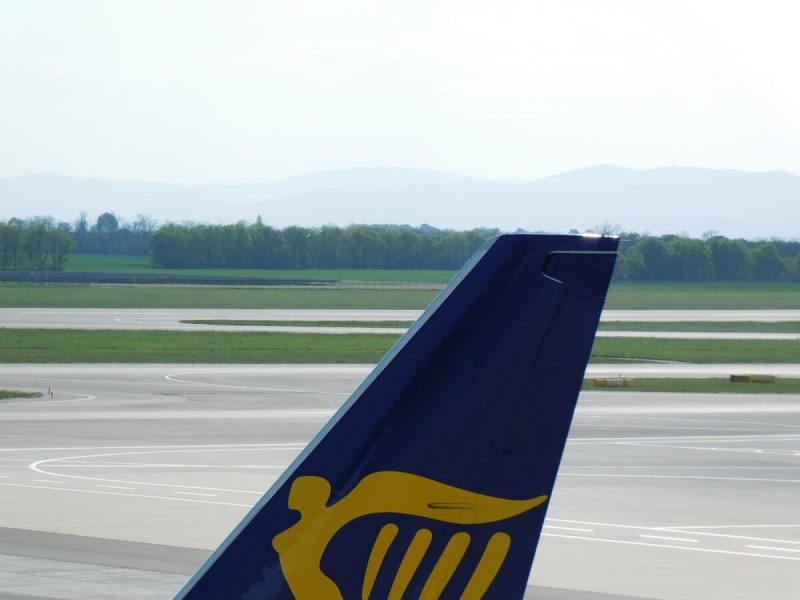The low-cost airline Ryanair has not been flying to Stuttgart-Echterdingen Airport for a long time. The carrier nevertheless voices considerable criticism of the fee structure at Baden-Württemberg's largest airport. This is said to be responsible for the fact that passenger numbers are still significantly lower than before the corona pandemic.
Stuttgart Airport has always had a somewhat differentiated relationship with low-cost airlines. Although Germanwings, Tuifly, Germania Express and some smaller providers were present in the past, Ryanair and Easyjet in particular avoided Baden-Württemberg's largest airport for many years. Wizz Air has never had Stuttgart on its route network as planned.
A few years ago, Easyjet and Ryanair started their services from this airport. The orange provider had a few routes, including the inner-German route to Berlin-Tegel. The Irish competitor initially operated under its own brand, then during a transitional period together with Laudamotion before everything was switched to Lauda as the base was set up.
At the beginning of the corona pandemic, the Lauda bases in Stuttgart and Düsseldorf were closed. In Baden-Württemberg the pretext was that employees had rejected wage cuts. These were accepted in Düsseldorf, but the base was closed because the airport or the local service providers allegedly did not want to grant discounts. Since autumn 2020, the Ryanair Group has not had a presence in Düsseldorf or Stuttgart.
However, the low-cost airline's latest media release implies that Ryanair is apparently very interested in flying from Baden-Württemberg's state airport again. However, the airport management is accused of not being willing to reduce fees in order to boost traffic again. In fact, Ryanair's withdrawal is not an isolated case, as its competitor Easyjet and other low-cost airlines have also permanently said goodbye to this airport in the wake of the corona pandemic.
Stuttgart airport boss Ulrich Heppe assumes that the state airport will not reach the volume it had before the corona pandemic until 2028 or 2029 at the earliest. In 2019, in which numerous low-cost airlines also operated from Stuttgart, the airport had 12,7 million passengers. In the first nine months of the current year there were only 6,5 million passengers, 35 percent less than in the same period in 2019.
Ryanair sees the reason for this as the fees and security charges would be expensive in direct comparison with other airports. It is suggested to management that they should turn down the price screw in order to create more traffic and connectivity. It is pointed out that the Karlsruhe/Baden-Baden subsidiary would already be at 120 percent of the pre-crisis volume.
“The latest traffic report from Stuttgart Airport is a perfect example of how the recovery of air traffic in Germany is lagging behind other EU countries. German traffic is at 77% of pre-COVID capacity and is the worst performing aviation market in Europe in terms of capacity recovery across all airlines, not just Ryanair. The German air transport fee structure is completely dysfunctional and uncompetitive, due to the government's excessive taxes and security fees and the airports' exorbitant fees, which have resulted in less competition and higher prices for German consumers, making it easier for airlines such as Ryanair , to base aircraft in other countries that incentivize traffic and connectivity with lower airport fees and growth incentives. If Stuttgart is serious about growth, it doesn't have to wait until 2028. The airport can pick up the phone and call Europe's largest airline, Ryanair. We can accelerate traffic recovery by resuming flights, provided the airport reduces fees and becomes more competitive. However, Stuttgart Airport is just one example (of many) of how dysfunctional the German aviation sector is. We reiterate our call on the German government to lower the cap on security levies to avoid the catastrophic impact that an increase in aviation security levies would have on Germany's competitiveness, recovery, consumers and economy, including a potential decline in Germany's GDP by 8,5 billion euros. So far, despite calls for talks, the German ministries for digital and transport as well as for interior and municipal affairs have been unwilling to engage in any form of discussion about the effects of the increased security levy,” said Ryanair DAC managing director Eddie Wilson.







 trail (for them it's free to use)
trail (for them it's free to use)